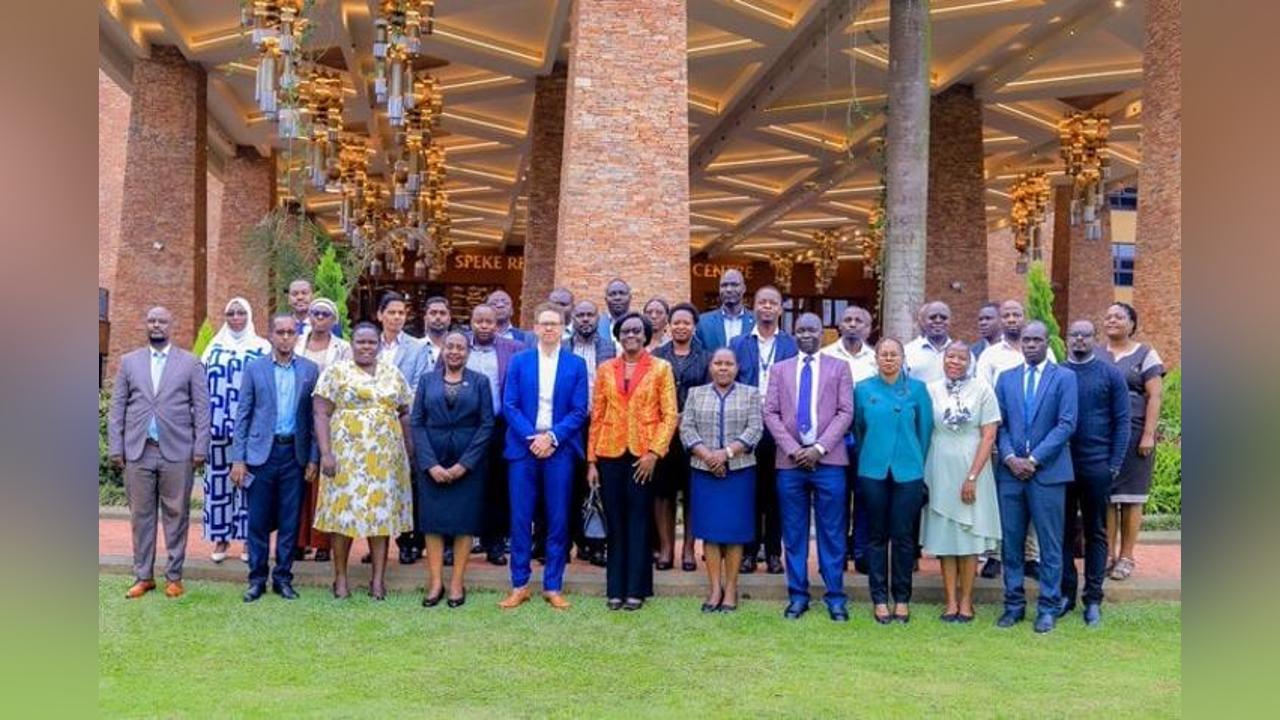Africa-Press – Uganda. Uganda has taken a bold step towards decarbonizing its aviation sector, with the Uganda Civil Aviation Authority (UCAA) launching a national workshop in partnership with the EU-CORSIA Africa and Caribbean Project aimed at integrating global climate targets into domestic aviation policy.
Held at Speke Resort Munyonyo, the three-day workshop brings together officials from government ministries, airlines, academia, and the aviation industry to discuss Uganda’s progress in cutting aviation emissions, exploring sustainable aviation fuel (SAF) opportunities, and implementing CORSIA-eligible fuels (CEF).
Opening the forum, UCAA Deputy Executive Director Olive Birungi Lumonya underscored Uganda’s commitment to aligning its aviation policies with global climate objectives and the International Civil Aviation Organization (ICAO) guidelines.
“Uganda fully identifies with the project and its aims of supporting targeted states to pursue ICAO’s recommendations and aspirational goals of reducing carbon emissions from international aviation,” Lumonya said.
“As an ICAO member state, Uganda is prepared to take necessary actions on environmental protection, including adopting sustainable aviation fuels, in line with the principle that no country should be left behind.”
New Emissions Data System Unveiled
Lumonya announced that UCAA has installed an Aviation Emissions Data Management System—a new platform to track fuel consumption and greenhouse gas emissions from airlines operating in Uganda.
“This platform will help collect, store, and verify carbon emissions data, allowing for systematic analysis and reporting,” she explained.
She emphasized the need for tangible progress beyond discussions, citing Tristar’s fuel blending capacity as a near-term opportunity to implement sustainable fuel use.
“Workshops and capacity-building are vital, but we need measurable results,” Lumonya added. “Our ambition is for Entebbe to become one of Africa’s first green airports.”
UCAA has already introduced electric buses at Entebbe International Airport and is planning broader initiatives around energy efficiency, water management, and green ground operations.
She also appealed for continuity of the EU-CORSIA Africa and Caribbean Project:
“If we stop at the first phase, we’ll leave everything hanging. A second phase is necessary to build on our momentum.”
UCAA’s Director of Safety, Security, and Economic Regulations, Irene Atoa, noted that Uganda has been a proactive player in global aviation decarbonization efforts since 2019 when it voluntarily joined the CORSIA scheme.
“Uganda was one of the first African countries to join CORSIA voluntarily and, in 2024, we became part of ICAO’s Capacity Building and Training for Sustainable Aviation Fuels programme with UK government support,” Atoa said.
She revealed that a Sustainable Aviation Fuels Feasibility Study is nearing completion, with preliminary results set to be shared at the conclusion of the workshop.
“We’re assessing SAF viability across technical, economic, and environmental dimensions,” Atoa said. “If integrated into national transport and energy strategies, SAF could cut emissions, create jobs, and enhance Uganda’s energy independence.”
Atoa called for stronger collaboration across ministries—including Transport, Energy, Environment, Agriculture, and Science & Technology—to turn international sustainability commitments into national implementation.
“We must transform knowledge into policy, policy into implementation, and implementation into measurable impact,” she stressed.
Khalid Muwembe, UCAA’s Environment Focal Point, highlighted Uganda’s rich biomass resources as key to unlocking sustainable fuel production.
“Our study found high potential in municipal solid waste, sugarcane, cassava, and bananas,” Muwembe said. “With the national refinery in Hoima, we have strong prospects for low-carbon fuel production—enough to become a regional SAF hub.”
He described aviation decarbonization not just as an environmental imperative but as an economic opportunity.
“Developing SAF in Uganda could support regional energy security and generate significant state revenue,” he added.
EU Praises Uganda’s Role in Climate-Aligned Aviation
Mark Latimer, representing the EU-CORSIA Africa and Caribbean Project, praised Uganda’s leadership in green aviation.
“It’s a privilege to wrap up this phase of the project in Uganda,” Latimer said. “We’re pleased to see Uganda actively engaged through the ACT-SAF programme and pursuing sustainable fuel development.”
He urged attendees to continue simplifying complex technical concepts around CORSIA and SAF to enable action among policymakers and operators alike.
For More News And Analysis About Uganda Follow Africa-Press






